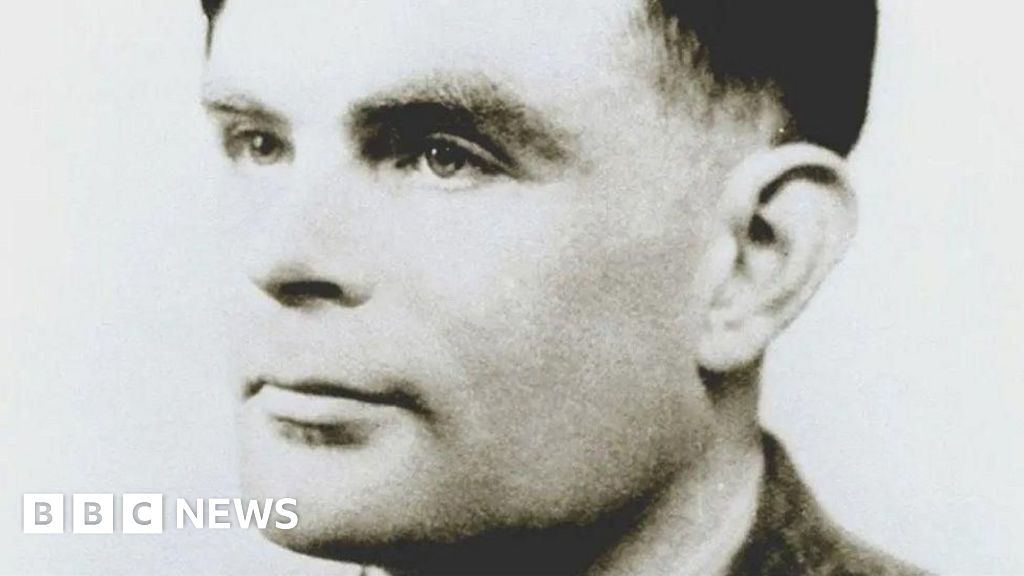Papers written by World War Two codebreaker Alan Turing have sold for a "record-breaking" price of £465,400 after they were found in a loft and almost shredded. The 1930s collection, which included a copy of Turing's PhD dissertation, went under the hammer in Etwall in Derbyshire on Tuesday. Turing, considered by many as the father of modern computing, played a key role in WW2 in helping to break the German Enigma codes at Bletchley Park. According to Hansons Auctioneers, one of the papers - On Computable Numbers - sold for "a remarkable" £208,000. Auctioneer Charles Hanson said he was "astonished" when the documents surfaced during a valuation event in Nottinghamshire. "To think these precious papers could've been lost to the shredder and now they will go on to educate and inspire generations," he said. "Turing was a man ahead of his time, and through these pages, he lives on." The papers were originally gifted to Turing's friend and fellow mathematician Norman Routledge. After Mr Routledge died in 2013, the documents were found at his home in Bermondsey, London, and taken away by one of his sisters. One of Mr Routledge's nieces, who has not been named, said they were untouched for years until the sister moved into a care home. Her daughters found the collection and "considered shredding everything" before they checked with the nieces and nephews. According to Hansons, Turing's PhD dissertation and On Computable Numbers are both hailed as foundational works in the field of theoretical computer science. Lichfield-based Rare Book Auctions, sister company to Hansons, had valued both of the papers at between £40,000 and £60,000. But the dissertation from 1938 or 1939, called Systems of Logic Based on Ordinals, sold for £110,500. Other top selling lots included Computability and λ-Definability and The World Problem in Semi-Groups with Cancellation, which sold for £26,000 and £28,600 respectively. Turing's final major work from 1952, called The Chemical Basis of Morphogenesis, went for £19,500, while his first published paper from 1935, Equivalence of Left and Right Almost Periodicity, sold for £7,800. In addition to the academic works, the sale featured personal items, including a handwritten letter from Ethel Turing explaining the gift of her son's papers to Mr Routledge. Jim Spencer, director of Rare Book Auctions, said: "This was the most important archive I've ever handled. "The papers came within inches of being destroyed, and instead they've captured the world's imagination. "It's a once-in-a-lifetime discovery – not just for collectors, but for the sake of preserving the story of one of the greatest minds in history." Mr Hanson added that the buyer was "absolutely over the moon" with the purchases. Follow BBC Derby onFacebook, onX, or onInstagram. Send your story ideas toeastmidsnews@bbc.co.ukor viaWhatsAppon 0808 100 2210.
Papers by WW2 codebreaker Alan Turing sell at auction for £465k
TruthLens AI Suggested Headline:
"Alan Turing's Papers Fetch Record £465,400 at Auction"
TruthLens AI Summary
Recently auctioned papers belonging to Alan Turing, the renowned World War Two codebreaker and father of modern computing, fetched a staggering £465,400, marking a record sale. These documents, which include Turing's PhD dissertation and other key writings, were discovered in a loft and were nearly shredded before being saved. The auction took place in Etwall, Derbyshire, and was conducted by Hansons Auctioneers. Among the standout pieces, Turing's paper titled 'On Computable Numbers' sold for £208,000, reflecting the immense historical and academic value attributed to his work. Auctioneer Charles Hanson expressed his astonishment at the find, emphasizing the significance of preserving Turing's legacy through these papers, which he believes will continue to educate and inspire future generations. Turing's contributions to breaking the German Enigma codes at Bletchley Park during the war are well-documented, and these papers further solidify his status as a pioneer in theoretical computer science.
The collection was originally gifted to Turing's friend, mathematician Norman Routledge, and remained largely untouched until his passing in 2013. After his death, the documents were discovered by Routledge's family, who initially considered shredding them. However, upon consulting with relatives, they decided to preserve the collection, leading to this remarkable auction outcome. The PhD dissertation, dating from 1938 or 1939 and titled 'Systems of Logic Based on Ordinals,' alone sold for £110,500. Other notable items included Turing's works on computability and semi-groups, which also attracted high bids. Jim Spencer, director of Rare Book Auctions, labeled the collection as the most important archive he has ever managed, highlighting its near destruction and the profound interest it has garnered globally. The buyer of the collection reportedly expressed immense satisfaction with their acquisition, underscoring the papers' significance not only to collectors but also to the preservation of Turing's extraordinary contributions to science and society.
TruthLens AI Analysis
You need to be a member to generate the AI analysis for this article.
Log In to Generate AnalysisNot a member yet? Register for free.
